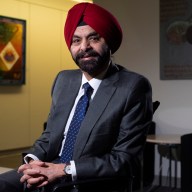« The nature of work has changed so much that people with jobs are taking classes day and night. »
In 1982, a year after he graduated from Central Technical School in Toronto, Edward Fenner was certified to be a computer repairman. But an economic recession killed his chances and he found work selling books at a department store and moonlighting as an armed courier. Then the mechanically inclined kid who liked writing answered an ad for a technical writer — and launched a career as a communications consultant. Now, more than 20 years later, he is reinventing himself again, as a mature student at York.
He’s not the only one. Twenty per cent of York undergraduates — 9,177 in 2007-08 — are mature students. Aged 25 and older, they come, like Fenner, to boost their credentials or fulfil a dream. Often juggling jobs and families as well as school, many have made sacrifices and are supremely motivated to succeed. They bring life experience and skills that enrich the classroom and campus alike. But their needs and concerns vary markedly from those of younger students straight out of high school. Which is why hundreds have flocked to join a mature students’ group Fenner founded shortly after he started at York, and why the university recently opened the Atkinson Centre for Mature & Part-Time Students (ACMAPS).
Fenner enrolled at York in 2004. Since the mid-1980s, he’s paid the bills as a freelance writer, editor and publications manager for corporations and governments. For years, he was senior managing editor, publishing liaison and information strategist for General Motors of Canada’s defence products division — his biggest client. More recently, he’s had contracts with IBM Canada, software developers and international publishers, producing technical manuals, user guides, educational materials and marketing communications. Though the money flowed, it never flowed consistently. “It was either feast or famine,” he says. He started applying for company positions. “I just didn’t want to be chasing the freelance tail all the time.” Yet he could rarely parlay his contracts into permanent jobs — because he didn’t have a university degree. “Over and over again, I’d end up training my new bosses, who had far less experience than me but a degree in some unrelated field,” says Fenner.
Then he turned 40. “I want to go back to school,” he announced one day to his wife Linda, a part-time teacher. With her encouragement, he registered at York. He would do a major in professional writing and a minor in science and society.
Money would be tight. Though he would continue to work, he would have to make more time for school. So he and Linda sold their house and moved into a smaller, maintenance-free townhouse closer to York and near a bus route. They don’t go out much and won’t replace their old car. But these are temporary privations until Fenner graduates in 2009 — or 2010.
It may take Fenner longer to earn his honours BA than originally planned. He is not only throwing himself into his studies, he’s exploring his creative side — and volunteering for one project after another.
He has thrived at York in ways he never expected. The once average high school student is now earning As and winning scholarships. He’s not just polishing his professional writing skills, he’s penning prize-winning poetry and plays.
But he’s really poured his heart and soul into extracurricular projects. Most recently, he breathed new life into Existere (see photo, top left), an ailing student literary and arts journal, and helped launch e-MAGINED, a new electronic magazine on international education for York International.
But Fenner’s pet project has been the York University Mature Students Organization (YUMSO). Over the past three-and-a-half years, he has logged more than 1,500 volunteer hours — most as founding president of this club. Like so many older students, he felt isolated and intimidated when he started at York and wanted to meet other adult learners. YUMSO quickly burgeoned to more than 600 members and became an advocacy and support group as much as a social club. Fenner has organized orientations, started speakers series, launched a website and set up a page on Facebook where members could network. He has spent hours mentoring newcomers and become a vocal advocate for mature students on and off campus.
For his efforts, Fenner won the Deborah Hobson Student Leadership Award in 2007. And he’s just been made a Fellow of Vanier College.
Last fall, York opened the Atkinson Centre for Mature & Part-Time Students. The centre offers information, advice, support, peer mentoring and a place to meet for the thousands of students over 25. In the past, the former Atkinson College catered exclusively to the needs of mature and part-time undergraduates when most worked full time during the day and took courses at night. But “the demographic has shifted,” says ACMAPS director Norma Sue Fisher-Stitt, York’s associate vice-president, academic learning initiatives. “Now, the nature of work has changed so much that people with jobs are taking classes day and night across all faculties, not just at Atkinson.” And their numbers are growing.
Of York’s 46,000 undergraduates, almost 9,200 — or 20 per cent — are aged 25 and over. Some are as old as 78, but more than 90 per cent of them are between the ages of 25 and 50 and have been away from school for years.
Mature students face different challenges than their younger, fresh-out-of-high-school classmates. Most juggle part-time or full-time jobs as well as family responsibilities. Child care, elder care and flexibility at work are big concerns. And because they aren’t up to speed with doing library research, writing essays or working on computers, “butterflies are common,” Fenner says. “But the intimidation factor really kicks in when they see they are older than many of the profs as well as most of the students.”
Nevertheless, they quickly hit their stride. Highly motivated to succeed, they do their readings, participate in class and work ahead on assignments. “They’re not here to goof around,” says Fenner. They might have been unexceptional students before, but they’re soon raking in As and high Bs, surprising themselves along the way.
“They know they want to be here,” says Fisher-Stitt. “They are making sacrifices to be here and are fully engaged in the process. They’ve been in jobs where they’ve realized the only way to progress is to get a degree. I’m constantly amazed and impressed at what they will carry to do well.”
Some have such busy schedules they hit their classes then run. But Fenner urges those who can to get involved. “I tell them this is their time at school, too, and they should make the best of it.”
He has. “I’m spreading my wings, putting my toes in the water,” says Fenner.
Coming to university “has been very much what I hoped it would be — an enriching experience. It’s reawakened my creative self and forced me to think more critically about myself and my direction. It’s provided me with more options. It’s redefined who I am.”













